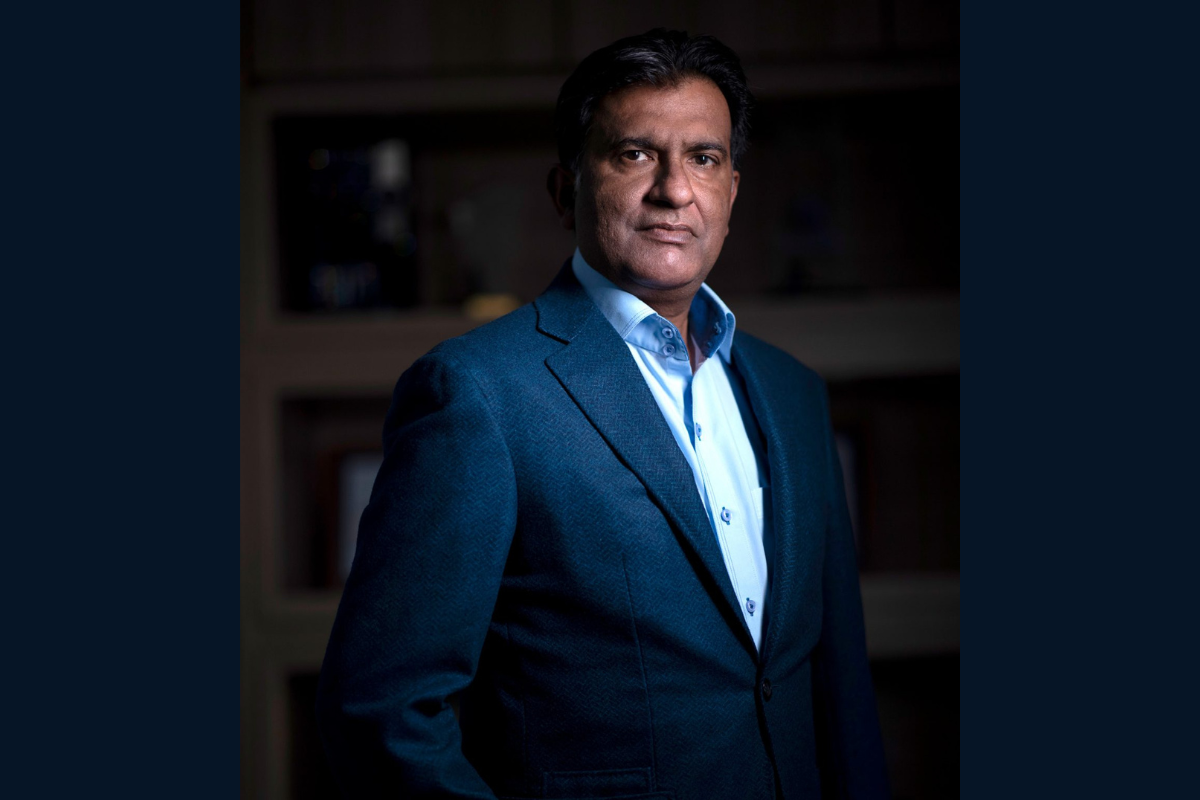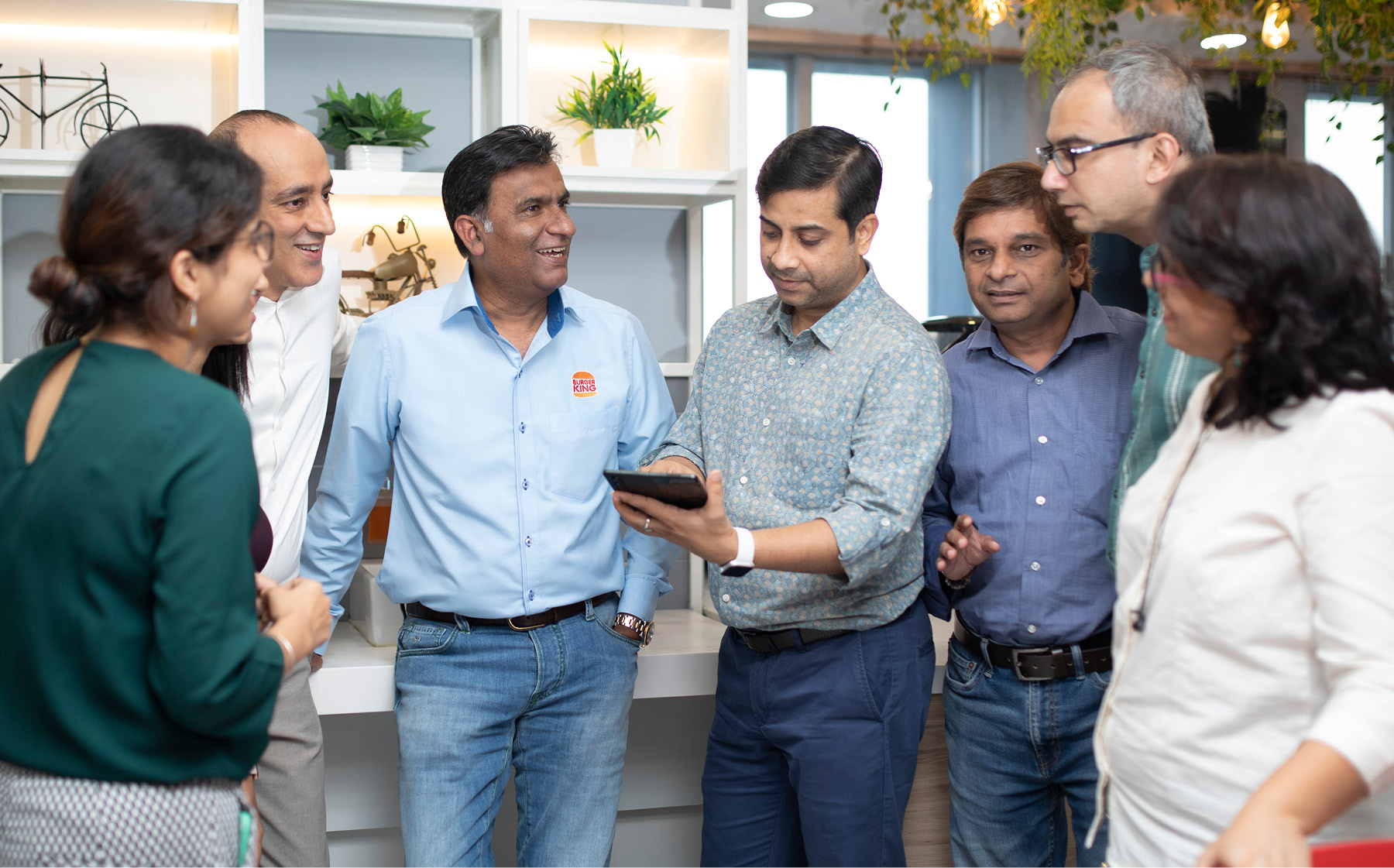Introducing an Icon to India: Rajeev Varman
Slinging innovation alongside burgers, shakes and an increasingly inclusive menu, Burger King is a global icon recognised by most. CEO of Burger King India Rajeev Varman shares his take on staying ahead of the curve and why it’s crucial to value every cog in the company wheel.
Kicking off his career in corporate fast food back in the early 90s at Taco Bell in California, Rajeev Varman first joined Burger King in 2000 in Canada as a Franchise Business Manager. He quickly worked his way up the chain to National Franchise Manager, then Senior Director of Franchise Operations before becoming Vice President and General Manager of the Canada region. "From there, I moved to Europe, based out of London, to oversee the Northwest Europe arm of the company. I moved to India in 2014, tasked with starting up Burger King in India."

With a career spanning more than two decades, Rajeev was not only a logical choice to bring such a big brand to a new country and region, but he has also been privy to the many changes in the business and the industry itself. He tells The CEO Magazine that back in the 1990s, when he was a restaurant manager, the management game in the fast-food industry was all about watching your grams, watching your degrees, watching your pennies and watching your seconds.
"Grams because this business is about food cost and how much food you waste. Degrees refers to the temperature of food – you have to ensure the food is hot. Pennies is because of the very tight margins, and seconds because it’s fast food, so you have to deliver products very fast," the CEO says.

Being vegetarian became very important for a brand that until now has been serving primarily beef all across the world.
While the landscape of fast food has evolved and moved with the times to encompass developing technology including mobile ordering and changing trends in customer demand – think healthier options and vegetarian and vegan offerings – Rajeev says some things remain the same. "Our customers expect the same things today that they expected 25 years ago, which is to have hot and fresh food in a very clean and safe environment from very friendly and fast people. That’s how I define this business."
Bringing such a behemoth to a new country is a big undertaking. Burger King opened their first 10 restaurants in India in the span of 54 days under the eye of Rajeev back in 2014. This rapidly expanded to about 90 stores in just three short years. "There’s a massive investment in opening a chain in a country," he shares. "There’s an investment in resources, both human and capital, and in building the brand."
In Rajeev’s view, there are two things you do when you start a company in a country, which are ideally done in tandem. One is to build the business. The other is to build the brand.
A brand like Burger King obviously has an inherent head start, and means rather than starting from scratch, it’s about building awareness of an existing global brand. To do this, Rajeev says they made the somewhat unusual call to go into television mass advertisement – a move he says most companies would avoid until they had more outlets in place, lest they create an appetite customers had nowhere to satisfy.
"The effect of that was that people started emailing us through social media and emails asking when we would bring the Burger King brand to their city. We created that demand as we were creating the supply by building the business or the restaurants in those cities."
It was also vital for Rajeev to establish an understanding of how their customers differ from those in other countries and ensure the company’s offering met these differences. He says most of the studies he read showed roughly half the country is vegetarian. He then noted that most of the meat eaters consumed a vegetarian diet at least one or two days a week, and the country observes religious days and months where the population becomes vegetarian almost as a whole.
"Being vegetarian became very important for a brand that until now has been serving primarily beef all across the world. So when we came here, we made an intentional effort to position ourselves as a predominantly vegetarian menu. While we do have a very large meat menu, we came out with one of the largest vegetarian menus in India’s burger space."
Likewise, variety is key – an Indian meal typically includes rice, chapati, a lot of curries, pickle and pappadums. This means it’s equally important to build a brand synonymous with variety, which Rajeev says they have succeeded in doing.
Fast forwarding from the early days, Rajeev says they have most recently built the first Burger King cafe inside one of their high-profile restaurants in Churchgate, Mumbai. He says this is the first step of an anticipated 25–30 such cafes across India. "Eventually, we aim to put a cafe in every one of our Burger King restaurants."
This forms part of their larger three-to-five-year plan for the Indian arm of the global burger juggernaut, which is aiming to get 700 restaurants into the region by December 2026. Rajeev says the plan includes building restaurants in malls, on highways and in metro stations.
"Metro is becoming a big element of India, with a lot of investment from various state governments and other companies to build up the metro system here in India. We are one of the first to start building just outside or inside a metro station. We’ll continue to do that, alongside building in airports, which we have already done."
By investing in our partners and making sure our growth equals their growth, we have ensured longevity through loyalty with them.
Having worked his way up the fast food ranks from restaurant floor to the executive suite has been vital to Rajeev’s success today. He believes knowing how to execute and run a restaurant is key to becoming an excellent CEO in his industry. "Learning comes as you grow through the ranks and see every level of the industry. As long as CEOs continue to spend the majority of their time in the restaurants and around team members and partners who help run our businesses, they will continue to learn and grow."
He says without this, it is difficult to understand how the measures you implement are received and how they are being executed by the restaurants. This experience has also provided invaluable insight to the most basic end of the operation – which is also ultimately the one the customer experiences.
"My first years running a restaurant showed me firsthand how the junior staff operate and what the typical level of commitment is. It also showed me how much education is involved in training staff in the most basic but essential tasks, such as cleaning and sanitising."
Rajeev considers every employee a partner and takes the same approach to the vendors they work with, which has led to long-term success.
There’s going to be a rainy day where you need to stand as partners, not as a buyer and a seller.
"In many cases, we started with vendors from very small businesses, building these partners up over a long time period," he says. "As an example, we worked with a very small company called HyFun in Gujarat. They were supplying potato fries to mom-and-pop businesses, and we started with them supplying French fries to our business.
"Slowly but surely, the owner bought more farms. They went to thousands and thousands of farmers, and they guaranteed their buy on an annual basis for potatoes, giving them the ability to provide specification on the potatoes to be produced and provide seeds and know-how on the type required to make our fries. Those farmers then got contracts and secured a livelihood supplying HyFun.
"When they wanted to do more, the owner of HyFun asked if he could supply patties. Today they provide one of our highest selling vegetarian patties. And by investing in our partners and making sure our growth equals their growth, we have ensured longevity through loyalty with them."
Rajeev says these long partnerships are vital to operations, and that Burger King India strongly believes in going into very small towns to create them. One example is a recent partnership with a vendor in Bangalore for hydroponic tomatoes and hydroponic lettuces – a first for the Indian arm of the global burger giant.
This partnership also illustrates Burger King India’s commitment to investing with its vendors in innovation. Hydroponic vegetables are grown in a very different environment, which must be kept free from insects or any type of worms. As the vendor it had partnered with was very small, Burger King needed to guarantee a long business agreement so that the supplier was able to invest money in improving the science behind vegetable production.
"If you don’t consider vendors part of your entire ecosystem and instead deal with them just as vendors, then you don’t build or have those long-term commitments," Rajeev says. "There’s going to be a rainy day where you need to stand as partners, not as a buyer and a seller. So when you invest emotionally, financially, commitment wise, science wise, when you invest in all these aspects, in the long term, you build a very strong ecosystem around you, and that helps you stay in business and grow your business in bad times and good times."
According to Rajeev, while there are currently 5,000–6,000 employees across Burger King in his region, across the entire ecosystem, this number likely sits from 60,000–70,000, and maybe even over 100,000. "You’re creating employment, not just for the employees or the partners working within your restaurant, but also for partners working in your suppliers’ environment," he says. "Success is not just about effectively managing cost, it’s about creating more business and improving quality. But you do a lot more than that – you’re creating employment in a country."
You have to invest in working with people. It’s not just about training them. It’s giving them life skills. It’s giving them skills they can use in the future, wherever they go.
Diversity in the workforce is also important, for example, Rajeev says around 30 per cent of people working in Burger King restaurants in India today are women. He says while employing women is a feat any business can achieve, it is important to create ongoing opportunities to allow people to flourish within the organisation, and open pathways to progress into management and leadership roles. "You have to invest in working with people. It’s not just about training them. It’s giving them life skills. It’s giving them skills they can use in the future, wherever they go," he explains.
Rajeev takes the approach of business second, learning first when it comes to employees and partners of Burger King, likening it to a university. "When people come in, this Burger King ‘university’ trains them," he says. "Whether they come into a restaurant to work, to our marketing department or to our operations department, this university will continuously train, train, train. And when they graduate, they move on to new jobs.
"We get new people in, and we train them. That’s the hat I wear – my job is to train people. And it’s a two-way stream. I’m not just teaching, I’m also learning from being in the restaurant at the same time. That’s my bottom line, my sense of how I run a company."